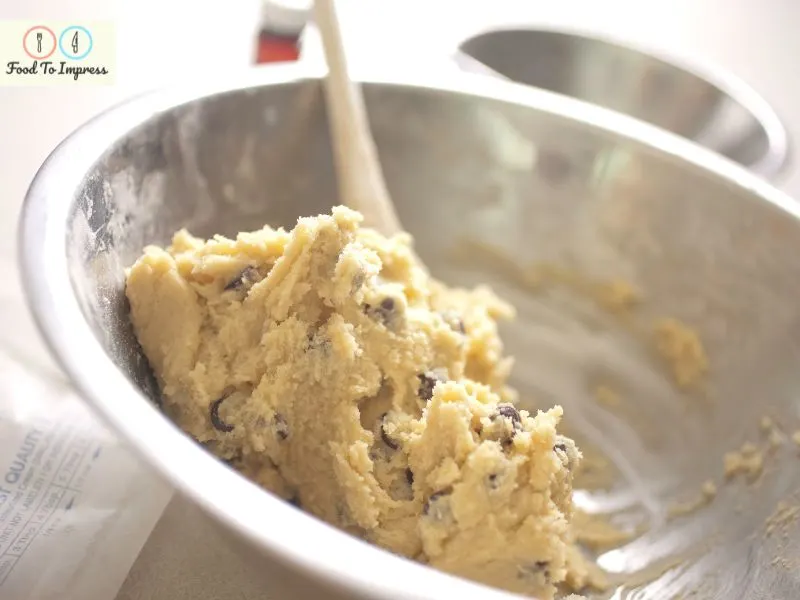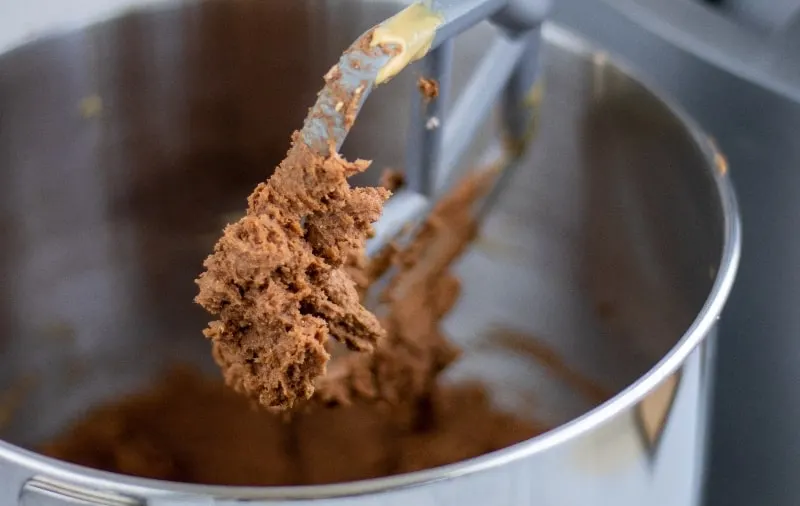Having sticky cookie dough is far from ideal. It’s difficult to handle, it’ll stick to your hands, kitchen utensils, and everything else you don’t want it to stick to, and it won’t bake properly. You are probably wondering why is my cookie dough sticky?
Baking sticky cookie dough almost always results in completely flat cookies that are too crispy and greasy. For this reason, you’ll probably want to avoid it. There’s not much worse in the kitchen than opening the oven and being met with a disappointing tray of unsuccessful cookies.
To fix sticky cookie dough, you should chill it for 30-60 minutes. This firms up the butter and allows the flour to absorb more moisture, making it easier to handle without it sticking to your hands or rolling pin. If it’s still sticky, add light dustings of flour and gently mix until it improves.
Fortunately, sticky cookie dough really isn’t the end of the world, so you don’t have to worry about it. The fix is easy, and once you know where you went wrong (if it wasn’t just the recipe), you’ll be able to avoid making the same mistake next time. With enough practice, you’ll be making the best cookies.
Before I go into more depth about sticky cookie dough, I need to mention that some types of cookie dough should be a little sticky. Having a slightly tacky or sticky feeling shows that the dough isn’t too dry, which is important if you want your cookies to spread just enough. If you don’t want your cookies to spread, they shouldn’t be sticky.

How To Make Cookie Dough Less Sticky
Now, if your cookie dough is too sticky, don’t just throw it out. You can easily make the dough less sticky, and easier to handle using one of the steps below.
Chill It
By just putting the cookie dough in the fridge for 30-60 minutes (the timing will vary depending on the volume), the dough will become much easier to work with.
The butter in the dough will have most likely been melted, or at least softened, to make the cookies, which causes the dough to become soft, pliable (maybe even runny), and sticky. Although you want it to be soft and somewhat pliable, you don’t want it to be very sticky.
If you’ve ever taken butter straight from the fridge, you’ll know just how firm it is. Butter is either very soft at room temperature or very firm when cold, and you can use this to your advantage
If you put your cookie dough in your fridge, the butter cools down and therefore becomes firmer, which results in cookie dough that’s barely sticky and much easier to work with. Do be careful with this – if you leave the dough in for too long, it may get too firm and make it difficult to scoop/shape the dough.
An added bonus to refrigerating your cookie dough is that you give the wet and dry ingredients more time to come together. This allows all the dry ingredients to absorb into the dough more, which reduces stickiness further.
Add More Flour
If chilling the cookie dough won’t do the trick, then the dough might be sticky simply because it doesn’t contain enough flour. If the cookie dough is dominated by wet ingredients, then you’re not going to have much luck with the cookies. You need the ratio of wet and dry ingredients to be right. Too much of either and you’re not going to get a good cookie.
The easiest solution is to sift in more flour until the cookie dough is more manageable, then continue as normal. Now, this is easier said than done. It’s very easy to add too much flour to the dough and end up with dry, dense cookies. Equally, if you don’t add enough extra flour, the cookies are still going to flatten out too much.
Sift in a small amount of flour at a time, then gently work it into the cookie dough and see where you can go from there. It’s completely trial and error at this point. You need to determine when the dough feels less sticky, but not too dry. Of course, the consistency you’re looking for depends on the type of cookie you’re making, so it’s up to you to add enough flour to balance the wet and dry ingredients for the best results.

What Causes Sticky Cookie Dough?
When cookie dough is sticky, it’s generally because there’s too much moisture. You need to get a good balance of the dry and wet ingredients so that the dough isn’t too wet or too dry. Having cookie dough that’s too wet results in cookies that spread out far too much during baking. Having cookie dough that’s too dry results in drier and harder cookies.
With that said, let’s look at the most common culprits for sticky dough.
Too Much Butter
Using too much butter will result in an overly wet, greasy cookie dough. During baking, they’ll spread out a lot and ooze out excess butter. This leaves you with paper-thin cookies sat on top of a puddle of grease.
Take another look at the recipe and make sure that you’re using the correct amount of butter. Some butter loss during baking is normal, but the cookies shouldn’t ooze out much or stay greasy after cooling.

The Eggs Were Too Large
A common mistake people make is using eggs that are just too big. This is generally only a problem if you use any size larger than medium. You might be able to get away with using large eggs, but you risk making the dough too wet.
Make sure that you’re using appropriately sized eggs. If need be, get smaller eggs, or whisk the eggs together and add the mixture bit by bit until the dough is just right. Remember, it’s always better to have cookie dough that’s slightly too dry than too wet, so be mindful of how much you’re adding.
When you use eggs that are too large not only will it make your dough sticky it may make your cookies too cakey too.
You Used Volume Measurements
The biggest mistake people make with any baking recipe is using volume measurements instead of weight. This is a mistake because volume simply isn’t an accurate measurement for most things, especially when measuring out flour.
Since flour is compressible, most people measure it out in different ways and get different results. One person’s cup of flour could be 110g, whilst another person’s could be 150g. I’m sure you can imagine just how much this can change a recipe when you’re using multiple cups.
Always use weight to measure out your ingredients. Your recipes will turn out much better, and you’ll have much less to clean up since you don’t have to clean every volume measuring utensil.
Can You Bake Sticky Cookie Dough?
Although it might be tempting to bake the sticky cookie dough and hope for the best, it’s not going to give you the best results. Baking sticky cookie dough will almost always end up badly.
Baking sticky cookie dough will only lead to cookies that come out too flat and crispy. These are often greasy due to a lack of dry ingredients to absorb the butter and eggs and may even burn, meaning that they can’t be eaten. It’s a good idea to fold in more dry ingredients to absorb the excess moisture.
Of course, this isn’t going to happen will all types of sticky cookie dough. No bake cookies are usually quite sticky. It ultimately depends on how sticky the dough is. If it’s only slightly sticky, that’s pretty normal and you should get good results. If it’s wet and too sticky to handle, then it’s most likely not going to work out.

